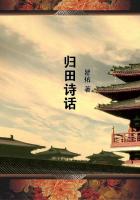The German line of the House of Austria was apparently more unfettered;but, in reality, though free from many of these restraints, it was yet confined by others. The possession of the imperial throne --a dignity it was impossible for a Protestant to hold, (for with what consistency could an apostate from the Romish Church wear the crown of a Roman emperor?) bound the successors of Ferdinand I. to the See of Rome. Ferdinand himself was, from conscientious motives, heartily attached to it. Besides, the German princes of the House of Austria were not powerful enough to dispense with the support of Spain, which, however, they would have forfeited by the least show of leaning towards the new doctrines. The imperial dignity, also, required them to preserve the existing political system of Germany, with which the maintenance of their own authority was closely bound up, but which it was the aim of the Protestant League to destroy. If to these grounds we add the indifference of the Protestants to the Emperor's necessities and to the common dangers of the empire, their encroachments on the temporalities of the church, and their aggressive violence when they became conscious of their own power, we can easily conceive how so many concurring motives must have determined the emperors to the side of popery, and how their own interests came to be intimately interwoven with those of the Roman Church. As its fate seemed to depend altogether on the part taken by Austria, the princes of this house came to be regarded by all Europe as the pillars of popery. The hatred, therefore, which the Protestants bore against the latter, was turned exclusively upon Austria; and the cause became gradually confounded with its protector.
But this irreconcileable enemy of the Reformation -- the House of Austria --by its ambitious projects and the overwhelming force which it could bring to their support, endangered, in no small degree, the ******* of Europe, and more especially of the German States. This circumstance could not fail to rouse the latter from their security, and to render them vigilant in self-defence. Their ordinary resources were quite insufficient to resist so formidable a power. Extraordinary exertions were required from their subjects; and when even these proved far from adequate, they had recourse to foreign assistance; and, by means of a common league, they endeavoured to oppose a power which, singly, they were unable to withstand.
But the strong political inducements which the German princes had to resist the pretensions of the House of Austria, naturally did not extend to their subjects. It is only immediate advantages or immediate evils that set the people in action, and for these a sound policy cannot wait.
Ill then would it have fared with these princes, if by good fortune another effectual motive had not offered itself, which roused the passions of the people, and kindled in them an enthusiasm which might be directed against the political danger, as having with it a common cause of alarm.
This motive was their avowed hatred of the religion which Austria protected, and their enthusiastic attachment to a doctrine which that House was endeavouring to extirpate by fire and sword. Their attachment was ardent, their hatred invincible. Religious fanaticism anticipates even the remotest dangers. Enthusiasm never calculates its sacrifices.
What the most pressing danger of the state could not gain from the citizens, was effected by religious zeal. For the state, or for the prince, few would have drawn the sword; but for religion, the merchant, the artist, the peasant, all cheerfully flew to arms. For the state, or for the prince, even the smallest additional impost would have been avoided; but for religion the people readily staked at once life, fortune, and all earthly hopes.
It trebled the contributions which flowed into the exchequer of the princes, and the armies which marched to the field; and, in the ardent excitement produced in all minds by the peril to which their faith was exposed, the subject felt not the pressure of those burdens and privations under which, in cooler moments, he would have sunk exhausted. The terrors of the Spanish Inquisition, and the massacre of St. Bartholomew's, procured for the Prince of Orange, the Admiral Coligny, the British Queen Elizabeth, and the Protestant princes of Germany, supplies of men and money from their subjects, to a degree which at present is inconceivable.
But, with all their exertions, they would have effected little against a power which was an overmatch for any single adversary, however powerful.
At this period of imperfect policy, accidental circumstances alone could determine distant states to afford one another a mutual support.
The differences of government, of laws, of language, of manners, and of character, which hitherto had kept whole nations and countries as it were insulated, and raised a lasting barrier between them, rendered one state insensible to the distresses of another, save where national jealousy could indulge a malicious joy at the reverses of a rival. This barrier the Reformation destroyed. An interest more intense and more immediate than national aggrandizement or patriotism, and entirely independent of private utility, began to animate whole states and individual citizens; an interest capable of uniting numerous and distant nations, even while it frequently lost its force among the subjects of the same government. With the inhabitants of Geneva, for instance, of England, of Germany, or of Holland, the French Calvinist possessed a common point of union which he had not with his own countrymen.
Thus, in one important particular, he ceased to be the citizen of a single state, and to confine his views and sympathies to his own country alone. The sphere of his views became enlarged.














